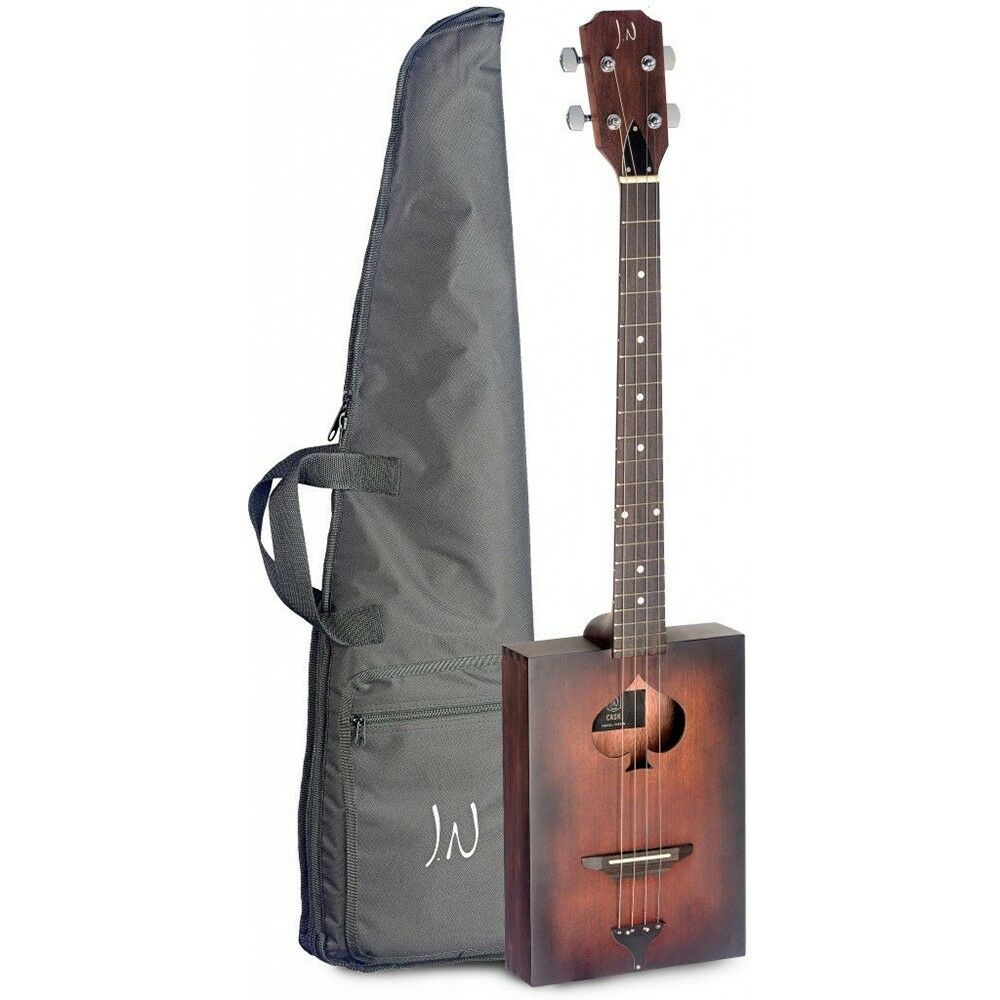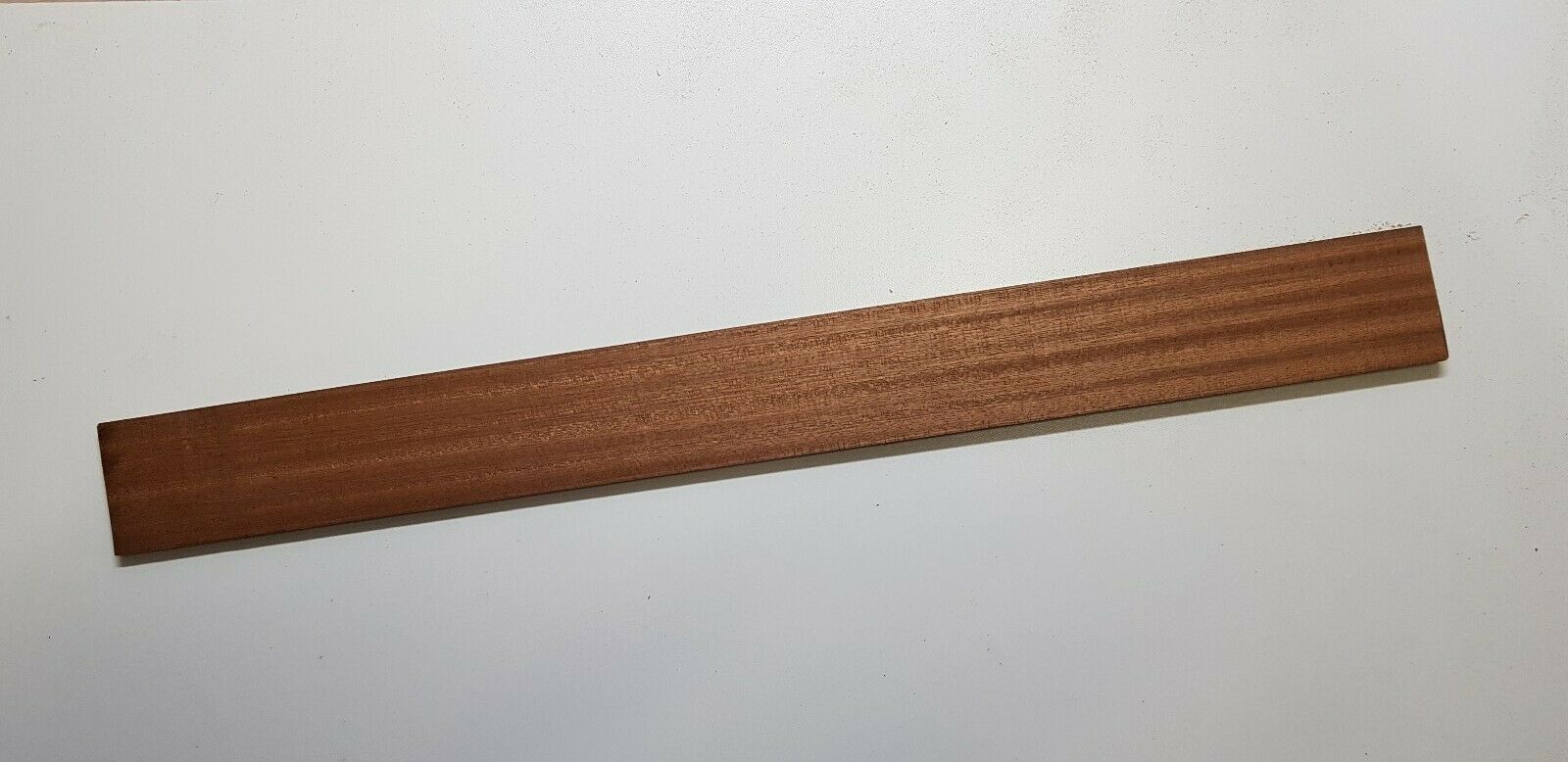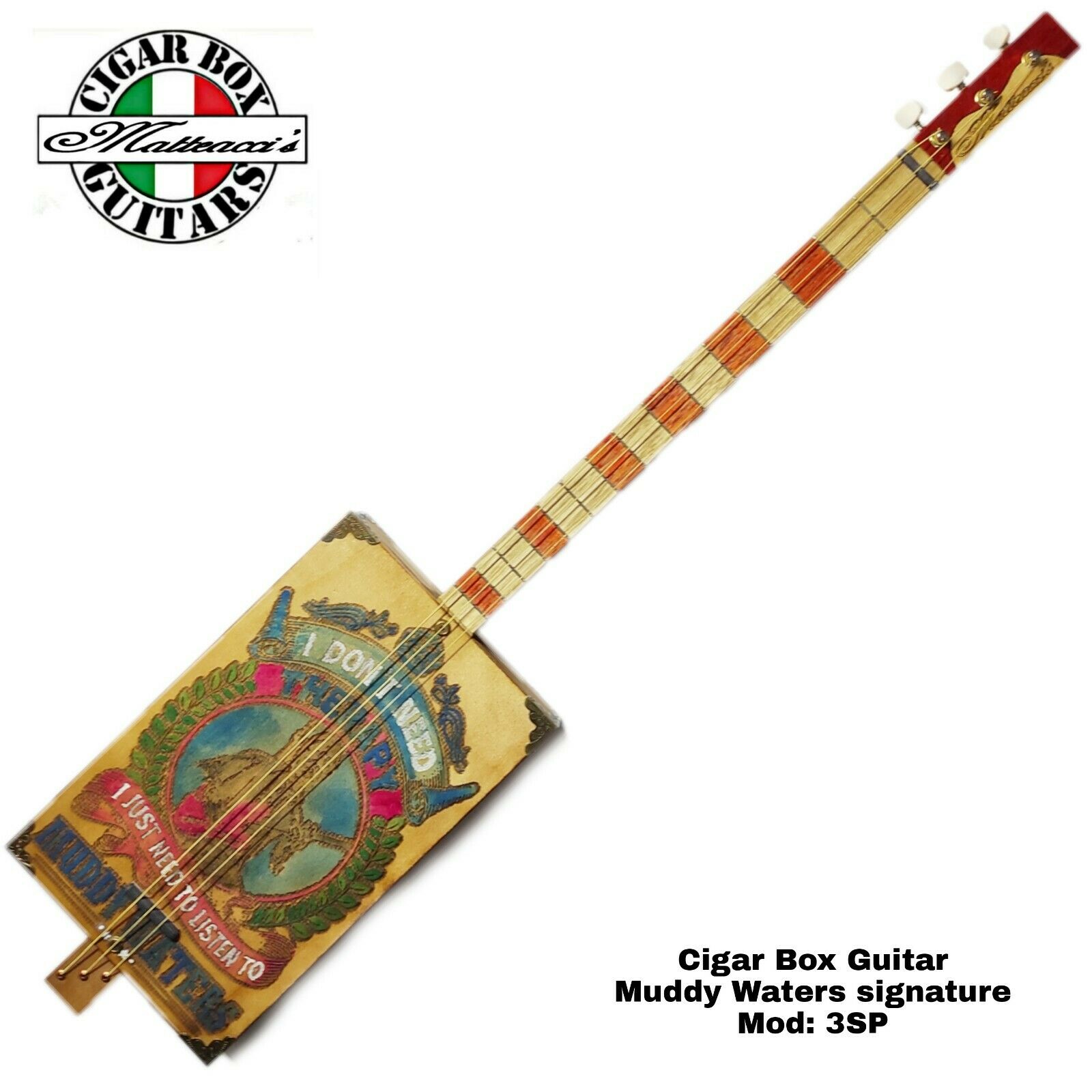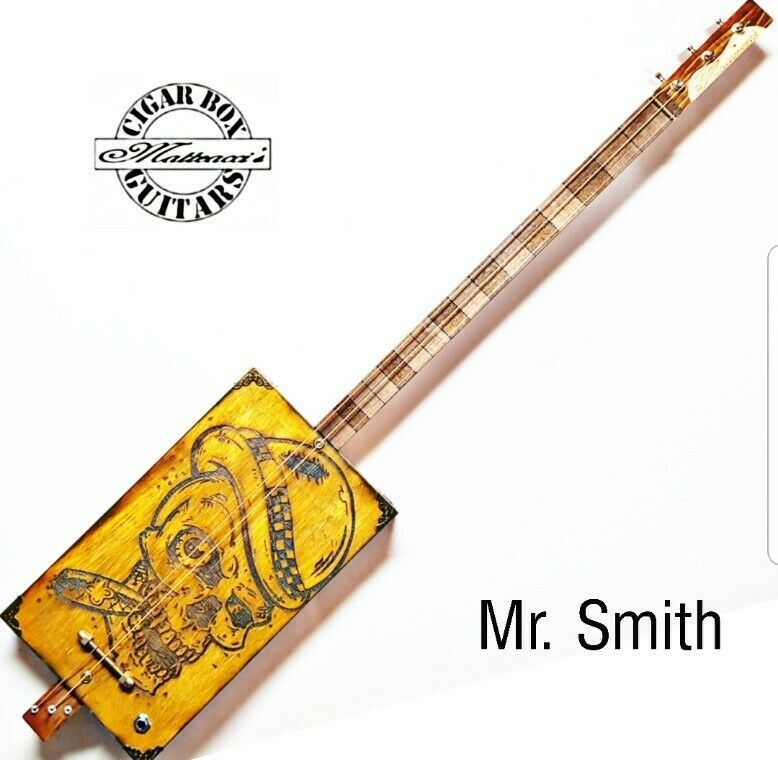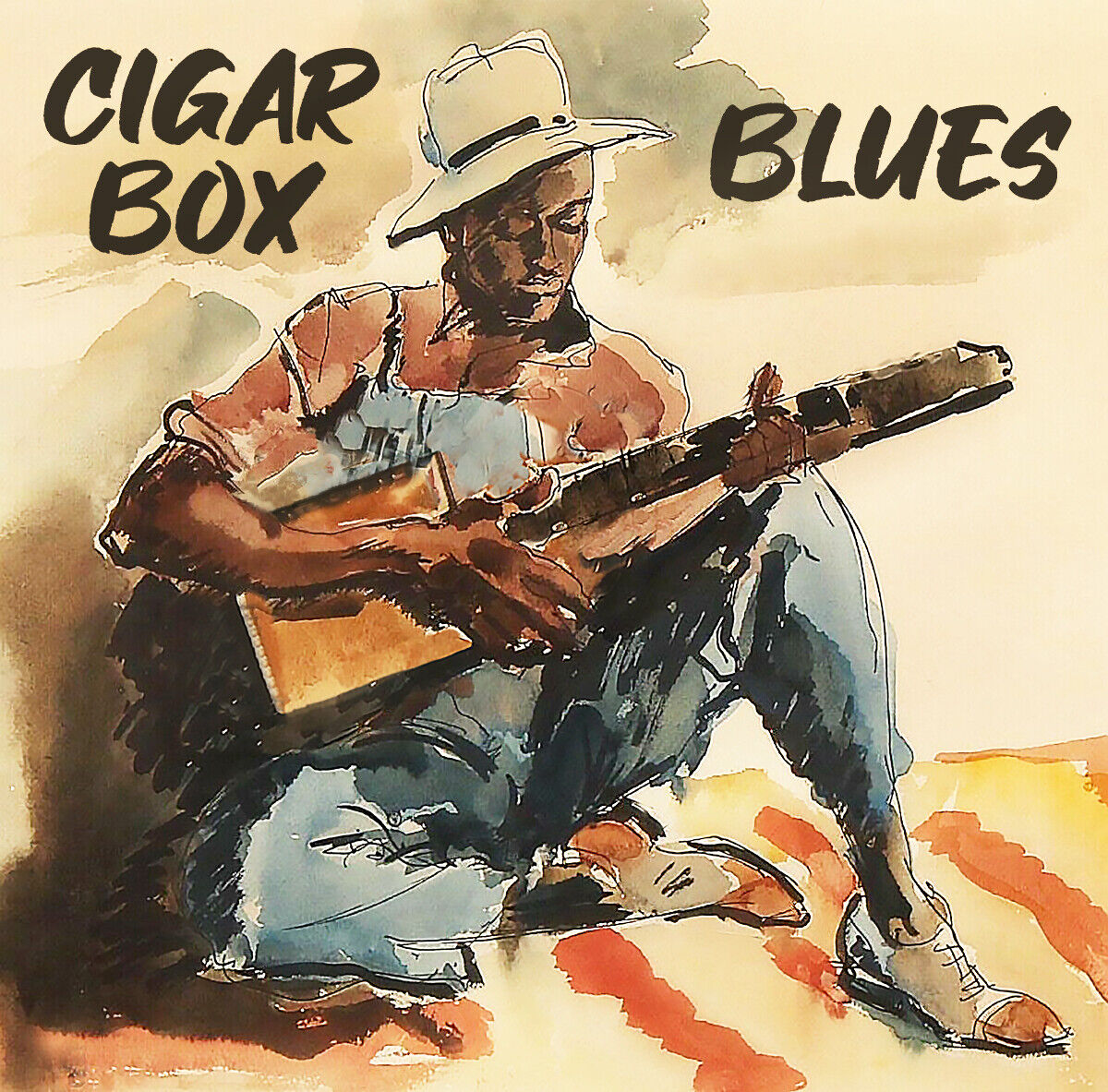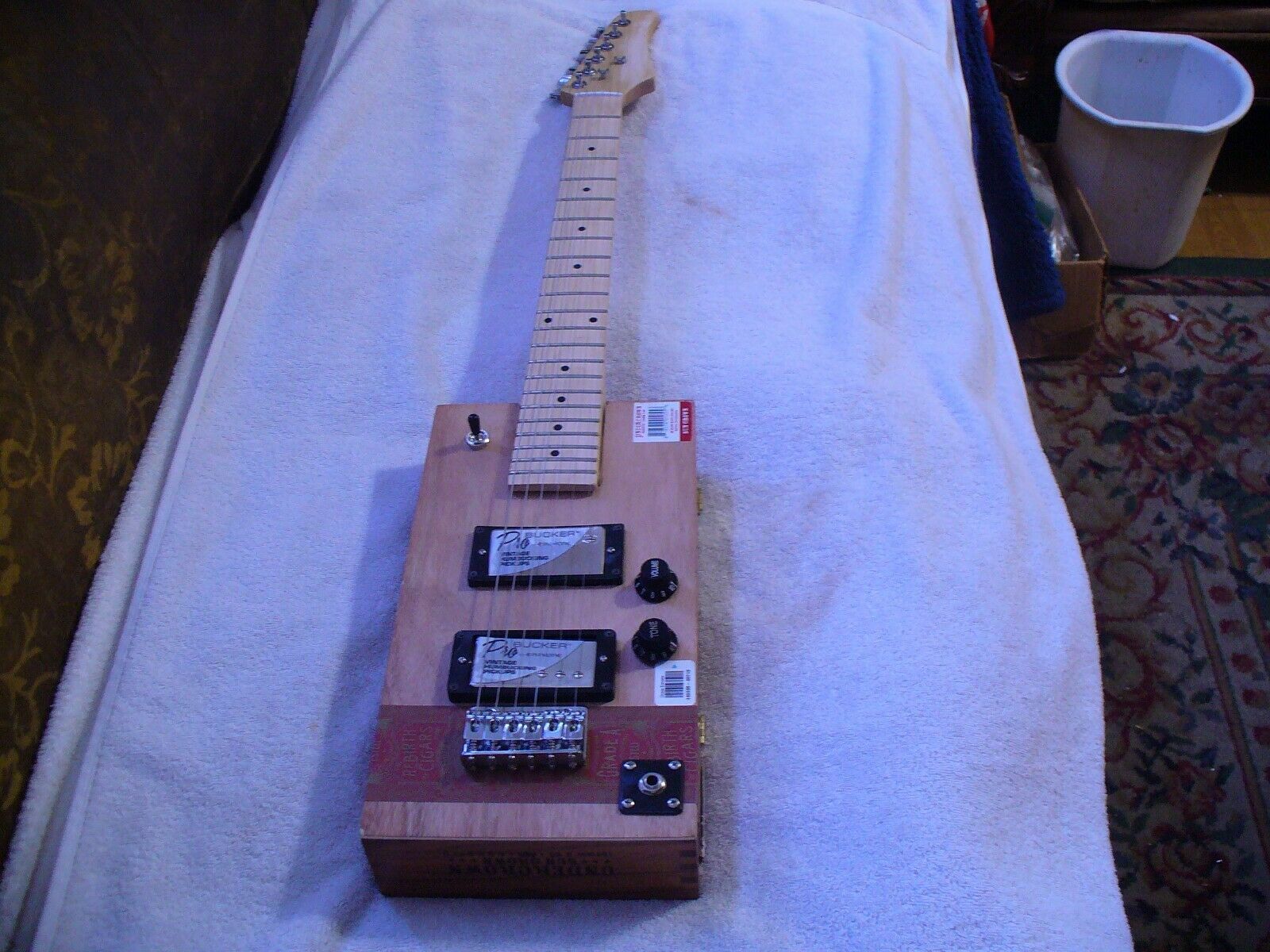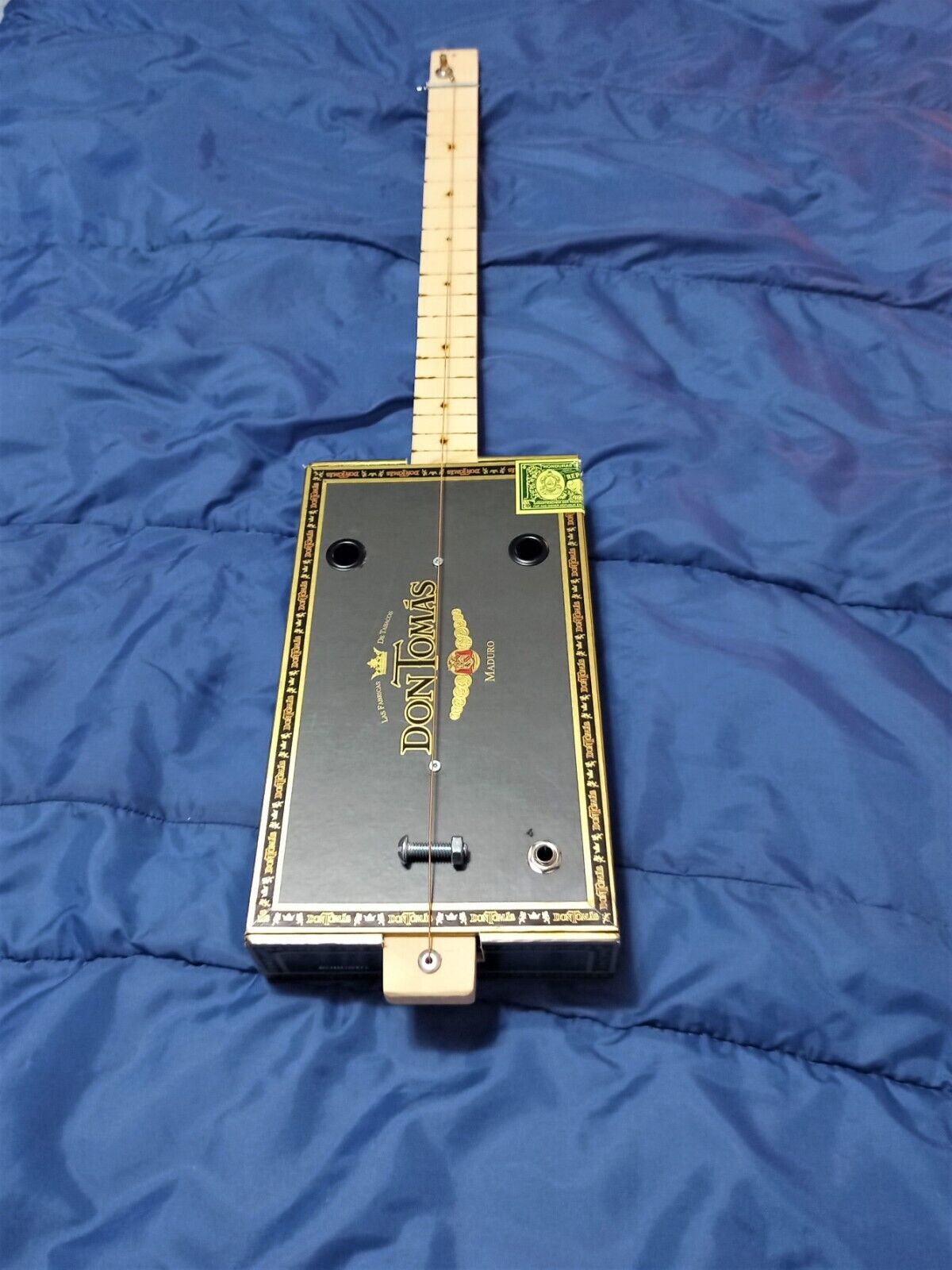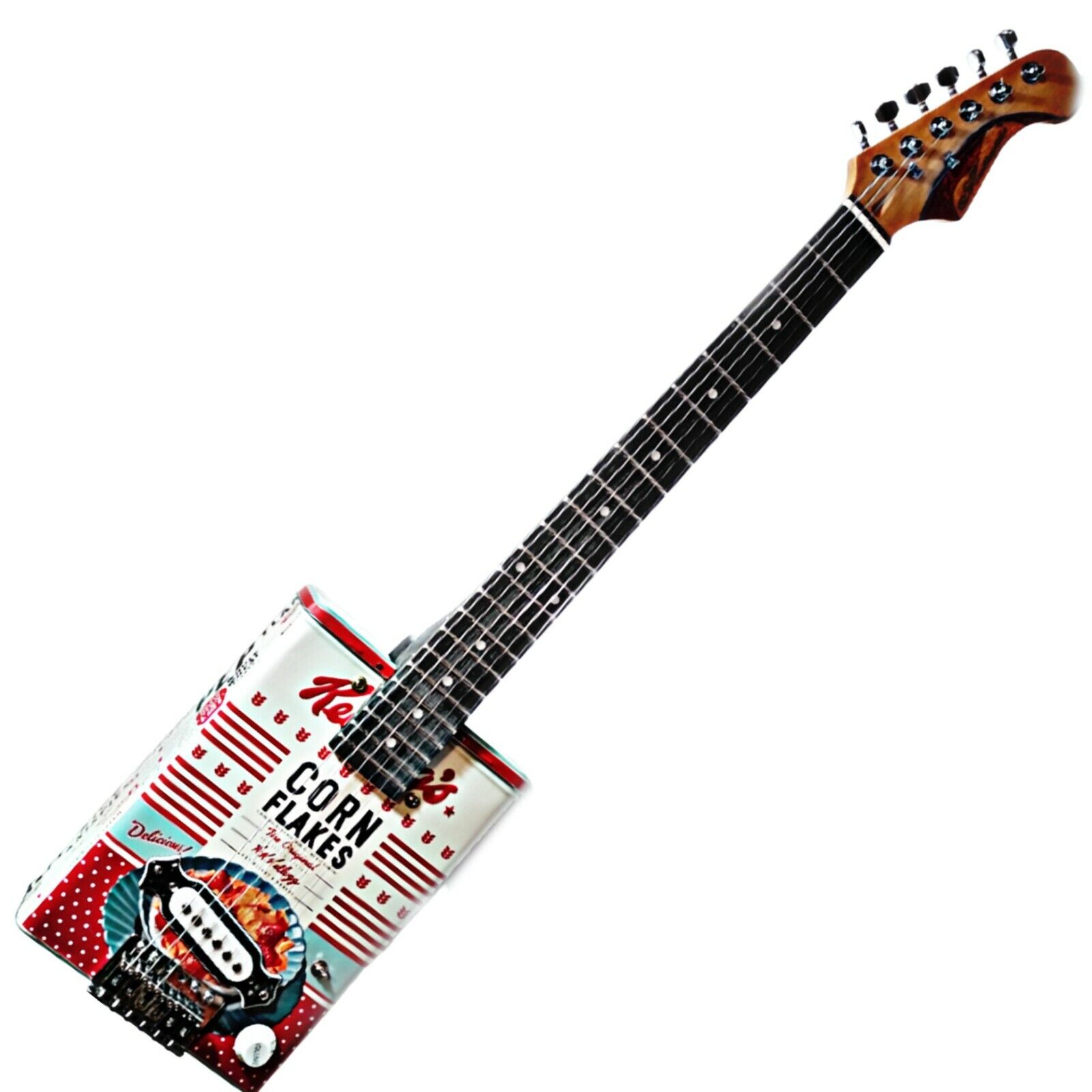-40%
Learn How to Play Cigar Box Guitar - Lessons - Tutorial - DVD
$ 11.61
- Description
- Size Guide
Description
MeadGuitars has teamed with international blues teacher, author, and musician Andi Saitenhieb to produce:Cigar Box Guitar - How to Play / Learn to Play
The Complete Guide This DVD contains more than 3 1/2 hours of detailed step-by-step instruction in over 70 short and easy to follow tutorials. Not only will you learn to play classic blues melodies and riffs, you will learn basic and advanced techniques and quickly become a great player; All from an experienced blues guitar teacher. The instruction assumes you have absolutely zero experience playing a stringed instrument, and brings you to a mastery level in no time.
Andi is a professional musician/teacher, specializing in Old School Blues (Delta Blues & Country Blues on acoustic, and Chicago Blues on electric). He provides private lessons and on-line blues guitar workshops. He is the author of two bestselling blues guitar books in Germany. Andi is also a contributing author for 'Gitarre & Bass', a popular Guitar magazine in Europe. For this DVD, he has remastered and videotaped the material in one of his books specifically for the Cigar Box Guitar.
Check out the
video
All of the tutorials on this DVD are played on a MeadGuitars 3 string CBG tuned to open G. However most all of the information presented can easily be uses on other instruments with other tuning. Although Andi is from Germany, his English is quite good. This DVD is recommended for anyone wanting to learn to play cigar box guitar. If all you want to do is pick up a few licks, turnarounds, and techniques, you can quickly and easily do that with this DVD. But if you also want to go deep into advanced blues techniques and theory, that is covered as well. Within days you will sound like you know what you are doing.
Within weeks you actually will know what you are doing.
The material is presented in concise 1 to 5 minute video clips, accessible in a easy to use DVD user interface. At your desk, in your living room, or in your hotel room, you will have ready access to dozens of tutorials in the following chapters:
Basic Techniques Advanced Techniques
Tuning
Blues Formulas
Intro's, Endings, & Turn-Arounds
Chords
Melodies & Riffs
Playing Slide
Hand Percussion
You will learn to play licks from blues guitar greats like Muddy Waters, John Lee Hooker, Buddy Guy, Robert Johnson, and Eric Clapton. There is even a version of Smoke on the Water by Deep Purple that you will actually be proud to play.
Although the course includes many videos on advanced chords and progressions, given Andi's casual teaching style, you can become very proficient at playing without ever looking at them. The Playing Slide chapter alone includes 8 different videos covering right and left hand techniques and will teach you slide songs from blues greats.
This DVD plays on TV's around the world as well as desktop and laptop computers.
Why not move to the next level with your cigar box guitar and REALLY learn how to play it well.
There are other less-expensive training DVD’s available on eBay. Our professionally edited and produced course is taught by a professional guitar teacher and musician containing significant quality and quantity of content, worth every penny charged. The price you pay for this DVD is a fraction of the cost of live one-on-one training that Andi provides all the time. There are also Cigar Box Guitar training books available on eBay as well. Learning to play anything using a book is much harder than visual, personal, video instruction.
Other Cigar Box Guitar DVD Offerings
How to Play Cigar Box Guitar BLUES
Over 2 hours of step-by-step instruction covering song components of 12 bar blues songs.
The numerous interchangeable song components you will learn are based on the works of blues founders Little Walter, BB King, Buddy Guy, Robert Lockwood Jr., Howlin' Wolf, Muddy Waters, and Junior Wells.
Includes innovative looping of demonstration videos, training videos, and each play-along song component.
Check it out here
Two Disc Combination
- This Complete Guide disc along with The How To Play Cigar Box Blues disc.
DISCOUNTED PRICE when you purchase both of these two discs covering both techniques AND the blues.  Great gift for yourself or someone you care about that would really like to jumpstart their Cigar Box Guitar experience.
Check it out here
Check out my other handmade items for sale
Guitars
Amps
Mics & Misc
Training DVD
History of Cigar Box Guitars – From Wikipedia
The
cigar box guitar is a simple chordophone that uses an empty cigar box as a resonator. The earliest had one or two strings; modern models typically have three or more. Generally, the strings are connected to the end of a broomstick or a 1 x 3 inch wood slate and to the cigar box resonator.
History
Cigars were packed in boxes, crates, and barrels as early as 1800, but the small boxes that we are familiar with today did not exist prior to around 1840.[1] Until then, cigars were shipped in larger crates containing 100 or more per case. After 1840, cigar manufacturers started using smaller, more portable boxes with 20–50 cigars per box.
Trace evidence of cigar box instruments exists from 1840 to the 1860s.[2] The earliest known illustration of a cigar box instrument is an etching copyrighted in 1876 of two American Civil War soldiers at a campsite, one of whom is playing a cigar box fiddle. The etching was created by illustrator and artist Edwin Forbes, who, under the banner of Frank Leslie's Illustrated Newspaper, worked for the Union Army. The etching was included in Forbes's work Life Stories of the Great Army. In the etching, the fiddle clearly shows the brand "Figaro" on the cigar box.
In addition to the etching, plans for a cigar box banjo were published by Daniel Carter Beard, co-founder of the Boy Scouts of America, in 1884 as part of Christmas Eve with Uncle Enos.[3] The plans, retitled "How to Build an Uncle Enos Banjo", were included in the 1890 edition of Beard's American Boy's Handy Book as supplementary material at the back of the book.[4] These plans omitted the story but still showed a step-by-step description of a playable five-string fretless banjo made from a cigar box.
It would seem that the earliest cigar box instruments would be crude and primitive, but this is not always the case. According to William Jehle, curator of The Cigar Box Guitar Museum and the author of One Man's Trash: A History of the Cigar Box Guitar,[2] the museum acquired two cigar box fiddles built in 1886 and 1889 that seem very playable and well built. The 1886 fiddle was made for an 8-year-old boy and is certainly playable, but the 1889 fiddle has a well-carved neck and slotted violin headstock. The latter instrument was made for serious playing.
Cigar box guitars and fiddles were also important in the rise of jug bands and blues. As most of these performers were black Americans living in poverty, many could not afford a "real" instrument. Using these, along with the washtub bass (similar to the cigar box guitar), jug, washboard, and harmonica, black musicians performed blues during socializations.
The Great Depression of the 1930s saw a resurgence of homemade musical instruments. Times were hard in the American South, and sitting on the front porch singing away the blues was a popular pastime. Musical instruments were beyond the means of most people, but with an old cigar box, a piece of broom handle and a couple of wires from the screen door, a guitar was born.
A modern revival of these instruments (also known as the Cigar Box Guitar Revolution) has been gathering momentum with an increase in the number of cigar box guitar builders and performers. A loose-knit group of underground musicians tour the East Coast of the United States each summer under the banner "Masters of the Cigar Box Guitar Tour." These musicians include Doctor Oakroot, Johnny Lowebow, Tomi-O and many others. A growing number of primitive luthiers are adding cigar box guitars to their items for sale. The Top cigar box guitar builders of today are Shane Speal, Mike Snowden, Del Puckett and Peter Lake of Heavy Fog Guitars.[5]
The modern revival is sometimes due to interest in jug bands and the DIY culture, as a cigar box is inexpensive in comparison with other factors, such as strings and construction time. Many modern cigar box guitar makers can be seen as practitioners of a type of lutherie and implement various personal touches, such as the addition of pickups and resonator cones.
A superior modern fiddle
The modern revival of cigar box guitars is documented in the 2008 film "Songs Inside the Box", which was shot primarily at the Cigar Box Guitar Extravaganza, an annual event held in Huntsville, Alabama. [6]
The Cigar Box Guitar Museum, a free display dedicated to cigar box guitars, is located in Speal's Tavern, a small blues club in New Alexandria, Pennsylvania. It is curated by cigar box guitarist Shane Speal and contains over 60 antique and modern cigar box guitars.[7]
Tuning
Many different tunings can be used for cigar box guitars. Common tunings are:
[8]
·
Open tuning
o
three strings: for example A – e – a or G – d – g
o
four strings: for example A – e – a – c#' or G – d – g – b
·
Classical tuning of a six-string guitar (E – A – d – g – b – e’)
o
three strings: for example A – d – g
o
four strings: for example d – g – b – e’
·
Magic jazz tuning: A – e – g
·
Hawaiian tuning: A – e – f#
·
Four string banjo tuning: D – G – b – d
Notable performers
·
Bo Diddley played a cigar box–shaped guitar.
·
Luther Dickinson, the guitarist of the North Mississippi Allstars, uses an electric cigar box guitar called the Lowebow.
·
Billy Gibbons of ZZ Top performs with a cigar box guitar made by Kurt Schoen.[9]
·
Frank Turner plays a four-string cigar box guitar built by Adam Holmes, of Dust Box Guitars.[10]
·
Richard Johnston, the subject of the 2005 Max Shores documentary Richard Johnston: Hill Country Troubadour, performs with a Lowebow. Johnston helped design the instrument with its builder, John Lowe.
·
Bonny B. plays with a cigar box with only two strings (octave chord).
·
Tom Waits plays cigar box banjo on his album Real Gone.
·
Jon Hembrey, lead guitarist of 2014 Juno nominees the Strumbellas, plays a three-string cigar box guitar built by Adam Holmes, of Dust Box Guitars.[10]
·
Seasick Steve plays several personalized and obscure instruments, including a cigar box guitar.[11]
·
Shane Speal, billed as "The King of the Cigar Box Guitar," performs exclusively with cigar box guitars in solo shows and with his group, Shane Speal's Snake Oil Band. He performs with self-built cigar box guitars and also with instruments by Daddy Mojo, Smokehouse Guitars, Tomi-O Hartwell, Johnny Lowebow, Kurt Schoen and Mike Orr.[12]
·
Ed King of Lynyrd Skynyrd plays a cigar box guitar made by Tomi-O.[13]
·
Harry Manx, a Hindustani slide master, plays a Lowebow cigar box guitar.
·
Chris Ballew, lead singer of the Presidents of the United States of America, has recorded with a one-string cigar box bass made by Shane Speal.
·
Vic Ruggiero, lead singer of the Slackers, recorded tracks in Japan for his upcoming solo album. He plays a four-string cigar box guitar built by Adam Holmes, of Dust Box Guitars.[10]
·
Joe Buck, performing as a one-man band and also as a member of Hank Williams III's band Assjack, plays a cigar box guitar made by Tomi-O.[13]
·
Robert Hamilton of the Low-Country Messiahs plays a three-string Tomi-O cigar box guitar.
·
PJ Harvey plays a Baratto Cigfiddle.[14]
·
Charlie Brown, of the Peanuts comic strip, played a cigar box banjo a few times in his first years (in the early 1950s).[15]
Lightnin' Hopkins played a cigar box guitar at times and said this on the subject:
So I went ahead and made me a guitar. I got me a cigar box, I cut me a round hole in the middle of it, take me a little piece of plank, nailed it onto that cigar box, and I got me some screen wire and I made me a bridge back there and raised it up high enough that it would sound inside that little box, and got me a tune out of it. I kept my tune and I played from then on.
— Lightnin' Hopkins

